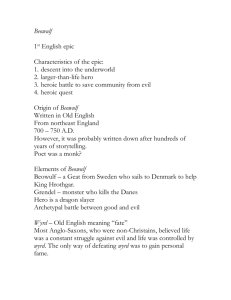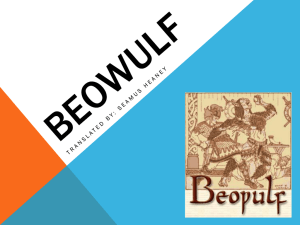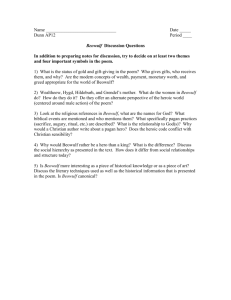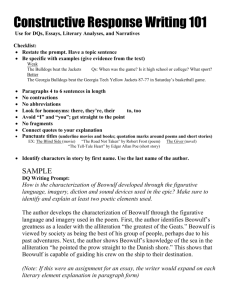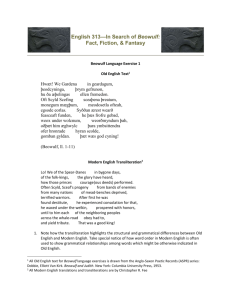Anglo-Saxon Unit Test Review.doc
advertisement
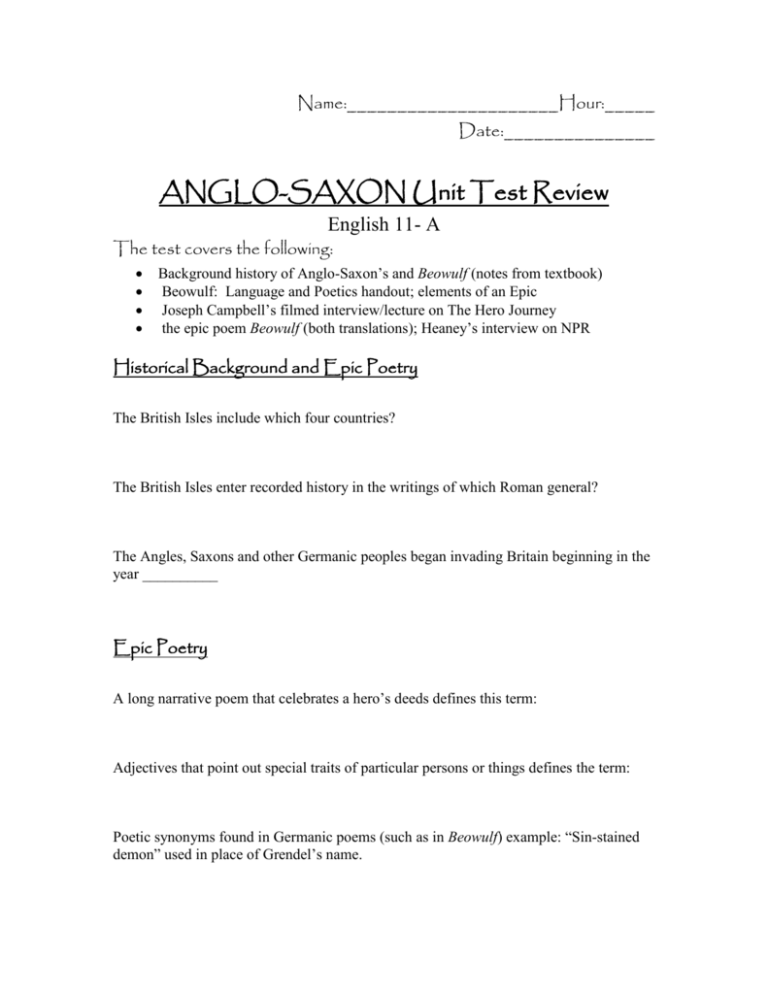
Name:_____________________Hour:_____ Date:_______________ ANGLO-SAXON Unit Test Review English 11- A The test covers the following: Background history of Anglo-Saxon’s and Beowulf (notes from textbook) Beowulf: Language and Poetics handout; elements of an Epic Joseph Campbell’s filmed interview/lecture on The Hero Journey the epic poem Beowulf (both translations); Heaney’s interview on NPR Historical Background and Epic Poetry The British Isles include which four countries? The British Isles enter recorded history in the writings of which Roman general? The Angles, Saxons and other Germanic peoples began invading Britain beginning in the year __________ Epic Poetry A long narrative poem that celebrates a hero’s deeds defines this term: Adjectives that point out special traits of particular persons or things defines the term: Poetic synonyms found in Germanic poems (such as in Beowulf) example: “Sin-stained demon” used in place of Grendel’s name. List the 10 characteristics of an epic: A. ____________________________________________________________ B. ____________________________________________________________ C. ____________________________________________________________ D. _____________________________________________________________ E. _____________________________________________________________ F. ____________________________________________________________ G. ____________________________________________________________ H. ____________________________________________________________ I. _____________________________________________________________ J. _____________________________________________________________ List three characteristics of a “hero” according to author Joseph Campbell: A. __________________________________________________________ B. __________________________________________________________ C. __________________________________________________________ Name the two types of deeds a hero can perform, according to Campbell: 1. _________________________________ 2. _________________________________ Define the term “hero” according to Joseph Campbell: from Beowulf Beowulf is a Geat warrior who crosses the sea to aid _____________________ in defeating the monster ________________________________ and later returns to Sweden to succeed his uncle Hygelac as king of the ___________________________. At the time of Beowulf’s deeds, the northern Germanic societies had not yet adopted Christianity. _____________________(T/F) The repetition of consonant sounds at the beginning of words “The ancient blade broke, bit into the monster’s skin, drew blood…”. This literary term is called: ______________________________________________ Poet singers called __________________________ in Anglo-Saxon society recited the poems in a chanting voice, usually accompanying themselves on a harp. Old English poetry has a strong rhythm with each line divided into two parts by a pause, called a ____________________________________. Beowulf is the most famous of the early Germanic heroic poems that survive. _______________ (T/F) Discuss the qualities and traits that Beowulf has: What element is shown to be most powerful and respected in Beowulf’s world? What things are associated with Grendel’s realm? How does Grendel respond to the realization that Beowulf will challenge his fighting skills? What does the alliteration in the following lines help most to heighten? “Herot trembled, wonderfully/Built to withstand the blows, the struggling/Great bodies breathing at its beautiful walls”? The fire dragon is awakened by an act of ___________________________ Discuss the difference in Beowful’s preparation for battle against the fire dragon from his preparation for battle against Grendel: When Beowulf realizes that the battle with the fire dragon will go against him, he does what? Why does Beowulf want Wiglaf to bring him the jewels from the fire dragon’s castle? . As Beowulf lay dying, his attitude toward his death is one of what? Also, discuss “wyrd”. The comment, “So gold can easily Triumph, defeat the strongest of men, No matter how deep it is hidden,” implies that lust for gold is Beowulf’s deeds require tremendous ___________________________? The main struggle in Beowulf is between: What does the alliteration in the following lines help most to emphasize? “But Higlac’s follower.../fastened those claws/In his fists till they cracked, clutched Grendel/Closer.” Beowulf believes that the outcome of all of his efforts is ultimately determined by what? The epic Beowulf reflects the belief that the battle between good and evil is: Vocabulary/Words to Know: affliction: cowering: fetter: gorge: infamous: lament: livid: loathsome: murky: pilgrimage: purge: relish: talon: taut: writhing: Beowulf: Language and Poetics English is divided into three periods. They are: 1. _________________________(ca. 449-1100) 2. _________________________(ca. 1100-1500) 3. _________________________(ca. 1500-present) Shakespeare’s English was ________________________________ (which of the three?) Chaucer’s poetry, including his most famous work, The Canterbury Tales, are a good example of _______________________ English poetry. Beowulf, which probably dates to some time between 700-1000 CE, is an example of a ___________________________English poem. T/F: The shifts from one standard language to a new one took hundreds of years. The __________________ Invasion in 1066 resulted in an influx of French words into the language. The combining of two words to make a new word is called: _________________ Define alliterative verse:____________________________________________ Define caesura:_____________________________________________________ T/F: Rhyme is so rare in Old English poetry that the one poem that does rhyme is known as “The Riming Poem”. Discuss the use of “variation” and “versification” in Old English Poetry.


